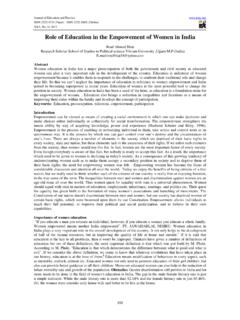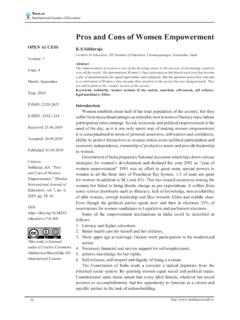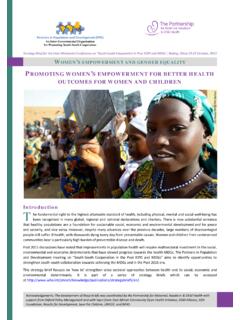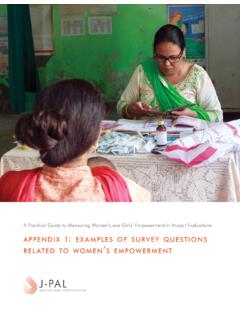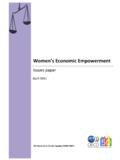Transcription of Gender equality and women's empowerment
1 13 Gender equality andwomen's empowerment :a critical analysis of the third MillenniumDevelopment Goal^Naila KabeerThis article discusses the third Millennium Development Goal (MDG), on Gender equality andwomen's empowerment . It explores the concept of women 's empowerment and highlights ways inwhich the indicators associated with this Goal - on education, employment, and political participation- can contribute to equality and women 'sempowerment is the third of eightMDGs. It is an intrinsic rather thanan instrumental goal, explicitly valued as anend in itself rather than as an instrument forachieving other goals. Important aseducation is, the translation of this goal intothe target of eliminating Gender disparitiesat all levels of education within a given timeperiod is disappointingly narrow. However,the indicators to monitor progress inachieving the goal are somewhat more wide-ranging: closing the Gender gap in education at alllevels; increasing women 's share of wageemployment in the non-agriculturalsector; and increasing the proportion of seatsheld by women in national this article, I interpret this as meaning thateach of the three 'resources' implied by theseindicators - education, employment, andpolitical participation - is consideredessential to the achievement of genderequality and women 's empowerment .
2 Eachof these resources certainly has the potentialto bring about positive changes in women 'slives, but, in each case, it is the socialrelationships that govern access to theresource in question that will determine theextent to which this potential is , in each case, there is both positive andnegative evidence about the impact ofwomen's access to these resources on theirlives. There are lessons to be learned fromboth. The article also considers some of theother 'resources' that have been overlookedby the MDGs, but could be consideredequally important for the goal in : agency,resources, and achievementFirst, however, it is important to clarify whatis implied by ' empowerment ' in this way of thinking about power is in termsof the ability to make choices. To bedisempowered means to be denied choice,while empowerment refers to the processesby which those who have been denied theability to make choices acquire such anability.
3 In other words, empowerment entailsGender anti Development Vol. 13, No. 1, March 200514 Gender and Developmentchange. People who exercise a great deal ofchoice in their lives may be very powerful,but they are not empowered, in the sense inwhich I use the term, because they werenever disempowered in the first , for there to be a real choice,certain conditions must be fulfilled: There must be alternatives - the ability tohave chosen differently. Poverty anddisempowerment generally go hand inhand, because an inability to meet one'sbasic needs - and the resulting depend-ence on powerful others to do so - rulesout the capacity for meaningful absence of choice is likely to affectwomen and men differently, becausegender-related inequalities oftenintensify the effects of poverty. Alternatives must not only exist, theymust also be seen to exist.
4 Power relationsare most effective when they are notperceived as such. Cender often operatesthrough the unquestioned acceptance ofpower. Thus women who, for example,internalise their lesser claim onhousehold resources, or accept violenceat the hands of their husbands, do sobecause to behave otherwise isconsidered outside the realm ofpossibility. These forms of behaviourcould be said to reflect 'choice', but arereally based on the denial of all choices are equally relevant to thedefinition of power. Some have greatersignificance than others in terms of theirconsequences for people's lives. Strategic lifechoices include where to live, whether andwhom to marry, whether to have children,how many children to have, who hascustody over children, freedom ofmovement and association, and so on.
5 Thesehelp to frame other choices that may beimportant for the quality of one's day-to-daylife, but do not constitute its definingparameters. Finally, the capacity to exercisestrategic choices should not violate thiscapacity on the part of concept of empowerment can beexplored through three closely interrelateddimensions: agency, resources, andachievements. Agency represents theprocesses by which choices are made and putinto effect. It is hence central to the concept ofempowerment. Resources are the mediumthrough which agency is exercised; andachievements refer to the outcomes of , each of these dimensions is consideredin turn, as is their interrelationship in thecontext of has both positive and negativeconnotations: Its positive sense - the 'power to' - refersto people's ability to make and act ontheir own life choices, even in the face ofothers' opposition.
6 Its negative sense - the 'power over' -refers to the capacity of some actors tooverride the agency of others through,for example, the exercise of authority orthe use of violence and other forms , as noted earlier, power alsooperates in the absence of explicit forms ofagency. Institutional bias can constrainpeople's ability to make strategic life or ideological norms may denyeither that inequalities of power exist or thatsuch inequalities are unjust. Subordinategroups are likely to accept, and even colludewith, their lot in society, if challenging thiseither does not appear possible or carriesheavy personal and social in relation to empowerment ,therefore, implies not only activelyexercising choice, but also doing this in waysthat challenge power relations. Because ofthe significance of beliefs and values inlegitimating inequality, a process ofempowerment often begins from within.
7 Itencompasses not only 'decision making' andother forms of observable action but also themeaning, motivation, and purpose thatGender equality and women 's empowerment 15individuals bring to their actions; that is,their sense of agency. empowerment isrooted in how people see themselves - theirsense of self-worth. This in turn is criticallybound up with how they are seen by thosearound them and by their are the medium through whichagency is exercised. They are distributedthrough the various institutions andrelationships in a society. In institutions,certain actors have a privileged position overothers concerning how rules, norms, andconventions are interpreted, as well as howthey are put into effect. Heads of households,chiefs of tribes, directors of firms, managersof organisations, and elites within acommunity all have decision-makingauthority in particular institutions by virtueof their position.
8 The way in which resourcesare distributed thus depends on the ability todefine priorities and enforce claims. Equallyimportantly, it defines the terms on whichresources are made available. If a woman'sprimary form of access to resources is as adependent member of the family, hercapacity to make strategic choices is likely tobe and agency make up people'scapabilities: that is, their potential for livingthe lives they want. The term 'achievements'refers to the extent to which this potential isrealised or fails to be realised; that is, to theoutcomes of people's efforts. In relation toempowerment, achievements have beenconsidered in terms of both the agencyexercised and its consequences. Forexample, taking up waged work would beregarded by the MDGs as evidence ofprogress in women 's , it would be far more likely toconstitute such evidence if work was takenup in response to a new opportunity or insearch of greater self-reliance, rather than asa 'distress sale' of labour.
9 It is also far morelikely to be empowering if it contributes towomen's sense of independence, rather thansimply meeting survival interrelationship between agency,resources, and achievementsThere is a distinction, therefore, between'passive' forms of agency (action taken whenthere is little choice), and 'active' agency(purposeful behaviour). There is also afurther important distinction betweengreater 'effectiveness' of agency, and agencythat is 'transformative'. The former relates towomen's greater efficiency in carrying outtheir given roles and responsibilities, thelatter to their ability to act on the restrictiveaspects of these roles and responsibilities inorder to challenge them. For example, inIndia, the reduction of overall childmortality has been associated with risingfemale literacy. This can be interpreted as theproduct of 'effective' agency on the part ofwomen in their role as mothers.
10 However,the reduction of Gender disparities in under-five mortality rates has transformativeimplications, because it shows a form ofagency that is acting against the grain ofpatriarchal values, which define daughtersas having less worth than focus in this article is ontransformative forms of agency on the partof women and on those achievements thatsuggest a greater ability on the part of poorwomen to question, analyse, and act on thestructures of patriarchal constraint in theirlives. The three dimensions that make up theconcept of empowerment can be seen asrepresenting the pathways through whichthese processes of empowerment can in any one dimension can leadto changes in others. For instance,'achievements' in one sphere of life can formthe basis on which women seek improve-ments in other spheres in the future.

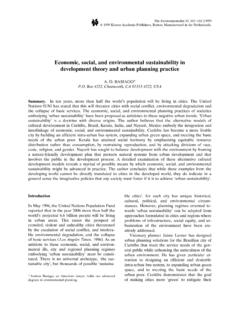

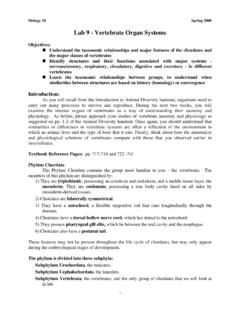
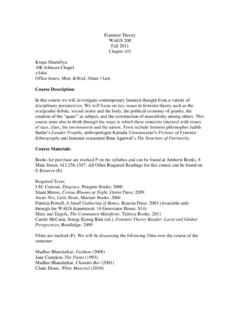

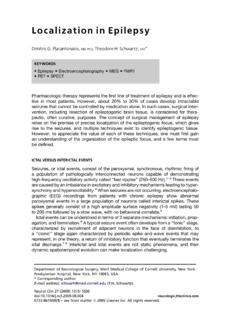
![[Fill-in-the-blank] tests measure and multiple choice ...](/cache/preview/5/e/e/9/b/f/1/7/thumb-5ee9bf17e1539b3a63fea89d05cad259.jpg)
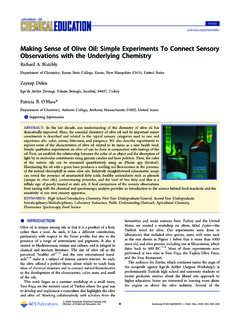

![Gender Equality and Women's Empowerment in India [OD57]](/cache/preview/0/7/f/d/9/7/1/6/thumb-07fd97166dd92c7359501888c42037d3.jpg)
